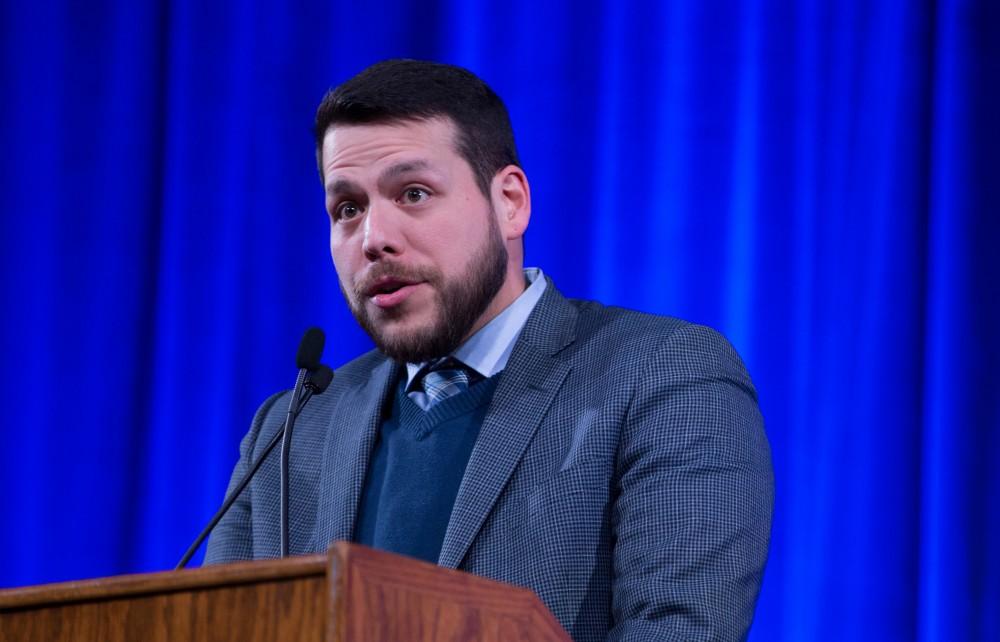Inclusion and Equity makes changes to Title IX policies

GVL / Kevin Sielaff – VP of inclusion and equity Jesse Bernal introduces the afternoon’s keynote speaker, Touré. Touré, Vice columnist and well known author, visits Grand Valley’s Allendale campus on a chilly Jan. 18, 2016. Hundreds of students gathered inside the Fieldhouse to listen to Touré’s keynote speech; the students also participated in a silent march before the event.
Apr 7, 2016
Grand Valley State University is one of a handful of public universities in Michigan being investigated for Title IX compliance. In attempts to continue to make improvements to the sexual misconduct policy at the university, Jesse Bernal, vice president of the Division of Inclusion and Equity, and Theresa Rowland, Title IX coordinator, have come up with a few changes to the policies and procedures in order to make them more effective.
Bernal and Rowland presented their provisions to student senate during its general assembly meeting on March 31. Rowland and Bernal hope these changes will provide more transparency to all parties involved in any sexual misconduct cases on campus.
“We want to be inclusive and equitable and welcoming, and we want to be a university that prevents and responds in a timely fashion (to) reports of sexual misconduct on campus,” Bernal said.
One change to the policy will effect faculty members’ response to sexual assault instances.
“What has changed is an explicit mandatory provision that many employees (are) required to report a count of sexual misconduct when they hear about them if they involve students, faculty, staff or visitors on campus,” Bernal said. “That’s what we call our responsible employee policy.”
Another large provisional change was to the notification department. Bernal said he wants the policy changes to be accessible to anyone who wants to read or review it.
“We have implemented in this policy an annual requirement for notification of the policy, how you report sexual misconduct that you experienced or that you hear about” he said. “(Also) how you receive resources and support from campus if you are a victim/survivor of sexual misconduct on campus or off campus.”
Bernal also said some of the definitions in the sexual misconduct policy. Sexual assault, sexual exploitation, intimate partner violence, stalking and cyber-stalking are all included and defined in the document. He also noted two sections that haven’t changed, but are still important: consent and incapacitation, especially if there is alcohol involved.
Student senate’s vice president of finance, Jeremy Turnbull, was curious as to how the police become involved, if at all. Bernal said this aspect of the policy has also not changed.
“We only contact the police if there is an immediate threat of violence or if the victim/survivor asks us to contact the police,” he said. “We take a victim-centered approach to the investigation.”
There are added sections about gender-based bias, retaliation and an appeals process where people can appeal the investigation.
Rowland emphasized the importance of transparency in these documents for any person reading them. She also discussed how people will be able to view and have access to their case.
“The importance here is (that) people really know what to expect when they make a report,” she said. “It’s detailed, it’s written, folks can review it and it won’t be a surprise.”
Senator Jewel Haji questioned how off-campus reporting works and if GVSU can still get involved in those cases. This, too, has not changed in the policy.
“We have some zones off campus that are considered part of our area, so some of the off-campus residents we have to report,” Bernal said. “The only way we will get involved in an investigation off campus is if someone reported it to us.”
Rowland said even if the report comes from an off-campus location, the university will always offer support, resources and recommendations to victims and survivors.





















